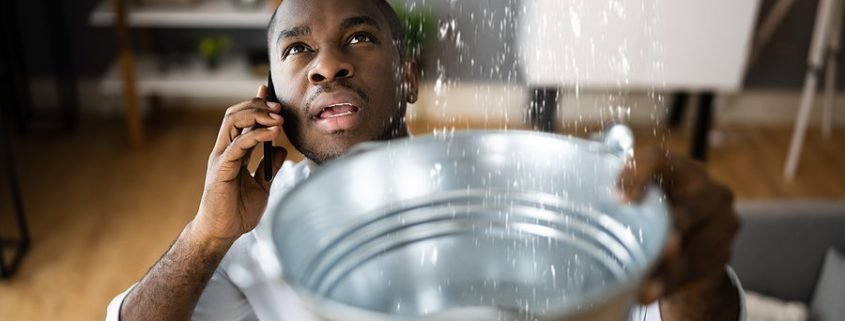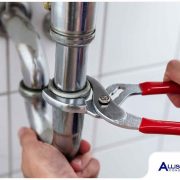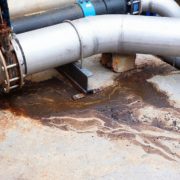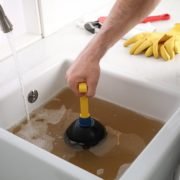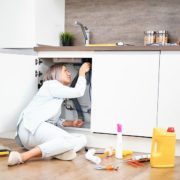How to Handle an Emergency Water Leak
Dealing with an emergency water leak is not generally one of the average homeowner’s preferred activities, but sometimes plumbing emergencies happen and require immediate intervention.
The worst part about water leaks? They’re sneaky. A leak isn’t always as obvious as the alarming gush of water from a broken pipe. They can show up as a slowly growing puddle of water on your floor. Perhaps a leak has formed a bubble under the skin of your wall paint, slowly expanding like a water balloon ready to burst. Leaks can start out small and grow gradually bigger, all the while dripping into the foundation of your home, collecting mold and attracting unwanted pests.
The least pleasant leak situations involve issues with the main sewage line. If you’re experiencing urgent problems, such as sewage backups, burst pipes, or flooding, you’re bound to feel a bit of panic and confusion: Where is all this water coming from? How bad is it? How do I stop it? This is not how I planned on spending my morning!
Take a breath and get moving. Signs of a severe water leak require immediate attention. If you find yourself with a water leak, acting quickly and intentionally can help prevent lasting damage to your home.
List of Contents
Act Fast: Turn Your Water Off
If you are able, immediately locate your water meter and turn off the water to your building. This step is crucial to stopping even more flooding from occurring. It is also a good idea to unplug electronics and appliances. If necessary, some may prefer the precaution of turning off the whole circuit breaker. However, should accessing the circuit breaker require you to stand in wet areas, wait for a professional. Water and electricity are a deadly combination that you don’t want to risk.
Clean Up the Mess
Clean up the spillage immediately. Still or standing water can cause serious damage to floors. If left to sit for too long, dampness can cause wooden planks to expand, grow mold, become uneven, develop stains, and buckle. These unsightly symptoms of water damage are also hazardous to the health and safety of those that live in your home, especially if the leak is coming from a broken sewer pipe.
Wear protective gear, such as boots, gloves, and goggles, and grab a mop. To soak up larger amounts of water, you’ll need towels and anything absorbent that you can spare. After you clean the water from the floor, wash and sanitize the parts of the house that the water has touched to prevent contamination. It’s best to use a dehumidifier and fans to dry out a room after it has been flooded. Leave these running overnight and keep the area ventilated, otherwise you risk mold and mildew.
Call a Professional Plumber
Serious water leak emergencies could be a symptom of a problem with the sewer main line. To prevent guesswork and fix the problem before the damage worsens, it’s best to get a professional assessment. Licensed plumbers will have the equipment and expertise to find the root of the problem quickly and perform the required maintenance. Do not try to independently fix a plumbing issue that caused flooding—you may unintentionally cause more damage.
Search for the Source
While you wait for plumbing services, play detective and try to find the source of the water leak. See if you can find where the flood originated from by listening for dripping or hissing sounds. In a pinch, silicone tape can temporarily patch over smaller leaks until a professional arrives. If the source comes in the form of a faulty sink or a clogged toilet, don’t worry—you’ve already turned the water off, so no additional flooding will occur. If you’re stumped about where the leak could be coming from, wait for your plumber. They will be able identify the cause and source of the leakage.
Dealing with Damage
The best piece of advice for dealing with water damage is to prevent it in the first place, but sometimes emergencies are inevitable. Do what is in your power to ensure that you deal with the original spillage in the moment. Deep clean and dry all rugs, furniture, and floor pieces that were soaked. If you have already incurred damage on your drywall, insulation, walls, or flooring, these may need to be removed and replaced. Dispose of damaged items that are no longer safe to use.
Keep Monitoring
Especially in the first few months after flooding or leakages, pay attention. Is your water bill abnormally high? Is there any new wall discoloration developing? Do you hear hisses or drips anywhere in the house? If you find that the answer is yes to any of these questions, you are likely dealing with another leak. Address any new plumbing problems promptly.
Make Maintenance a Habit
Regular plumbing maintenance helps prevent emergency problems like severe water leaks. Even after you receive plumbing services and get any obvious leaks repaired, it’s important to schedule regular plumbing maintenance checks at least every two years. Taking care of your home’s plumbing system decreases the chances of plumbing emergencies, and it also ensures that your systems stay safely up to code.
Making sure that your plumbing system is routinely inspected decreases the chances that leaks will sneak up on you. Plumbers can detect problems before they start. Catching small issues early on might require a little extra preparation on your part, but it will save you from emergencies, damage, and much larger bills down the road.
Contact Us
If you’re experiencing a water leak, we can help. Call us at 650-374-0868 or fill out a contact form by clicking here to get connected with one of our representatives.
At Palo Alto Plumbing, we pride ourselves on providing excellent service. Our two decades of experience serving clients in Palo Alto and the surrounding communities make us the preferred local choice for quality plumbing services. We can handle all of your emergency or run-of-the-mill plumbing problems. Give us a call and let us take the problem off of your hands.

